#pastorintraining
Explore tagged Tumblr posts
Text
Divinity: Mastered
Well, yes and no, but as of Tuesday, I officially completed all classes and assignments for my Masters of Divinity! I’m waiting on final grades and on Friday will officially be a seminary grad!

After 3.5 years it feels crazy to finally be here, graduating seminary with my Masters of Divinity. As this chapter in my life closes I reflect back on all the things I did in seminary, and suddenly, I feel like my perpetual exhaustion has all been validated:
I took 26 classes in 5 semesters across 3 campuses. I lived in Philadelphia, took some classes in Gettysburg, and for the last year joined the Distance Learning crew online and on Zoom. I took classes in theology, history, faith formation, administration, worship, and so much more. Some of my favorite were definitely: The Lord’s Supper and the Church as Communion, Jesus and Cultural Perspectives, Theology and Praxis of Disaster Spiritual Care, and the travel seminar to Israel, Palestine, and Jordan.
I completed field education with Upper Dublin Lutheran Church. I was at church every Sunday, preached a few times each semester, attended or taught confirmation, adult forum, and some Sunday School classes, and did countless other programs with the church. While also taking classes.

I completed Clinical Pastoral Education - I spent 10 weeks working at Thomas Jefferson University Hospital in center city Philadelphia. I met with patients and families in the Neuro Intensive Care Unit, Surgical Intensive Care Unit, the Emergency Department, and much more. I listened to stories, sat with people while they died, and learned a lot about the incredible health care workers who work so hard. I held the record for number of traumas in one night and the record number of total deaths in a CPE unit. It was hard but so holy.
I spent a year on internship working full time at First Lutheran Church in Waltham, MA. The first six months were filed with preaching, teaching, leading Bible Study, visiting members, planning worship, and more. The last six months were figuring out how to do church at the beginning of the COVID-19 global pandemic. I learned first hands the realistic demands of ministry and fell absolutely in love with pastoral ministry.

I worked at the Lutheran Archives Center at Philadelphia helping to preserve Lutheran history. I spent countless hours inventorying objects, artifacts, documents, and photographs from conventions, gatherings, and congregations dating back to the 1700′s in some cases. It taught me a lot about how much the church changed in just the last few hundred years.
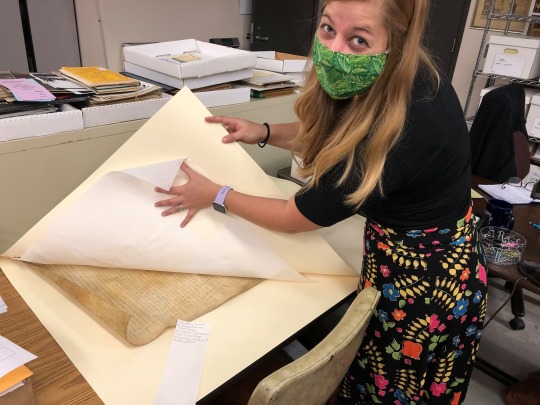
Pre-pandemic we had social gatherings and outings. Thursday Church Key (drinking/ social time), evening Compline worship, Wednesday chapel and community lunch, Thursday breakfast and dinner church, Sunday family dinner, Monday outings at McMens, snowball fights, football practice, and so much more. It’s this social time that I’ve missed the most in the last year with the pandemic. But we still found ways to get together outside for meals and games, worship together on Zoom, and have hallway distanced gatherings.
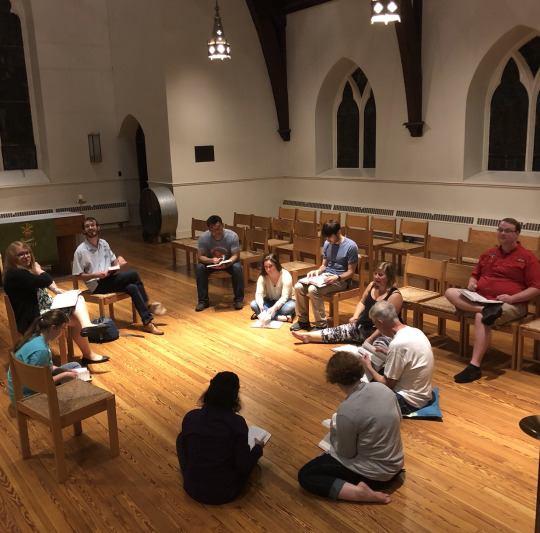
Above: gathered for Compline, Below: Luther Bowl 2019
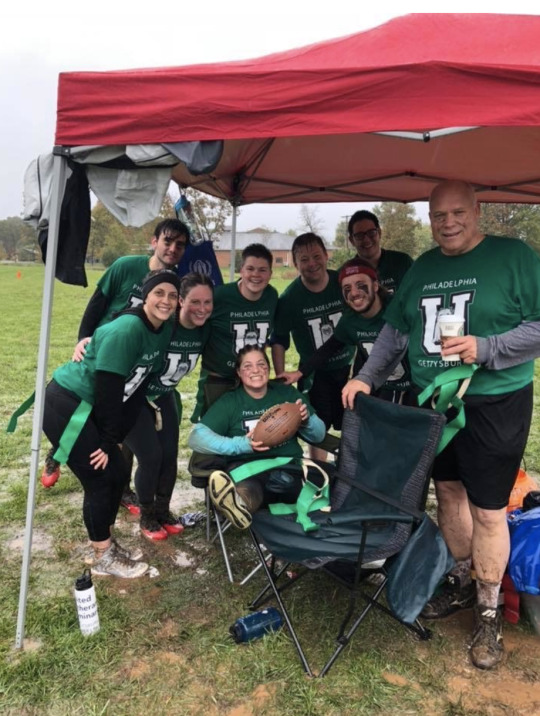
I made friends from near and far. Some from the same synod, others from new synods and states, and some from across the country and world. I also reconnected with friends from ELCA Youth Gatherings and from Young Adults in Global Mission. They have all taught me something unique and interesting about church, faith, and this crazy journey we are on.
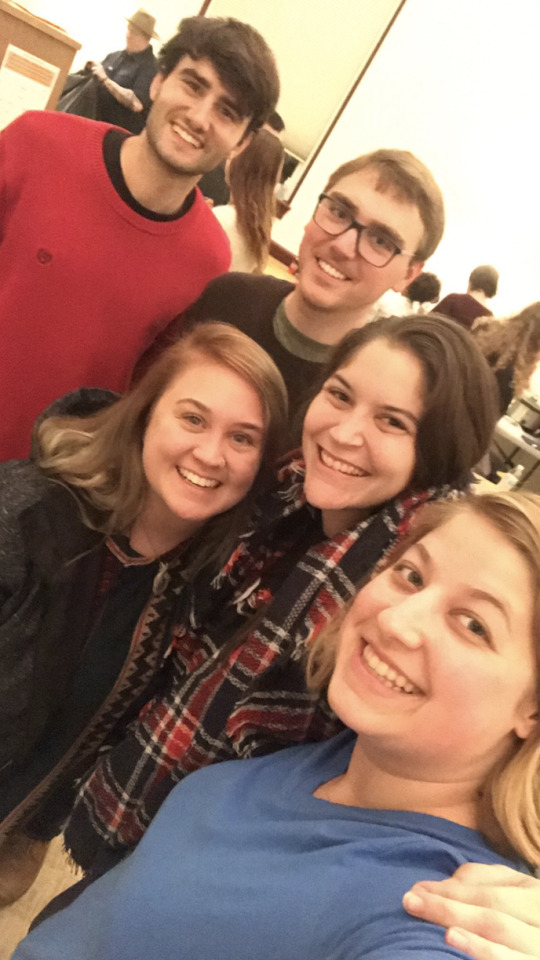
Above: YAGM friends in seminary at ULS and LTSS - Justin: Mexico, Luke: Argentina/Uruguay, Rebekah: Hungary, Catherine: UK, Me: South Africa, Below: one of the many pre-pandemic family dinners

I wanna take a minute to shoutout my best friends from seminary. Zach Dean, (now) Rev. Stephen Boyhont, and Justin Marx. These dudes supported me during meltdowns, shared food, friendship, and laughter, and were always down for an adventure to Trolly Car, Earth Bread, or Ritas. Seminary would not have been the same without them. Also a huge shoutout to Sarah Marx and Ana Crivelli (soon to be Dean) for keeping all of us sane - we wouldn’t be where we are without your love and support.
Stephen is now off doing the pastor thing in Milwaukee, WI! Prayers and blessings to Zach and Justin as their next steps continue to unfold. Enjoy this transformation photo from 2019 (pre-internship and pandemic) to our goodbye gathering for Stephen in April 2021.
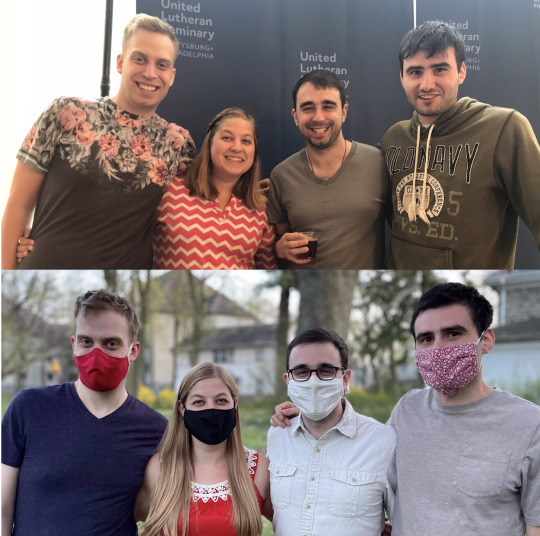
There won’t be an in-person graduation ceremony, which is okay. It would have been nice to see all my friends one last time, but safety is of the utmost importance. We will all be together again someday, maybe a reunion? Maybe some ordinations in the future? Maybe future weddings (looking at you Zach and Ana)! We may be all over the country, but we will always be connected.
So what’s next for me? This is a journey filled with prayer and discernment, completing my master’s degree was just the beginning. That being said, I’m currently in conversation with the New Jersey Synod of the ELCA in the hopes of finding a congregation where I will serve my first-call as pastor! Stay tuned to see how the future unfolds!
3 notes
·
View notes
Photo

And just like that, 5 years of preparation, studying, learning, lots and lots of prayer, he's off to his pastoral licensing board. I'm so proud of him and awed by where God has taken us on this journey. I can't wait to see what he does next. @preachermiah #preacherman #wearefoursquare #pastorintraining #walkinfaith #called #pastorlicensing
0 notes
Photo

Today was a special day. I had the honor and humble experience to serve along with my sweet and amazing friend @bettiewells to the fabulous, incredibly gifted and talented Congresswoman Michele Bachmann. This woman is a powerhouse and she has inspired me to be bold and courageous in my call. We are each a part of the body of the Christ. Each of us have a gifting and specific job to do. Her challenge was will you accept your role in the body of Christ, will you do what you have been purposed and created to do? Some will step boldly into that call immediately. Some will be shrink back and run in the opposite direction. Some will be scared and overwhelmed by the weight of their call because their past rears it repetitive message "of your not good enough, your not smart enough and your not talented enough" but NO MORE will the deceiver be allowed to keep those messages on replay. Which path will you take? #boldlymoving #boldlyserving #pastorintraining http://ift.tt/2fDA0Mg
0 notes
Photo

"Church should be a refuge for all wear travelers." @glennondoylemelton #pastorintraining #woundedhealer #preach #love #forgive #heal #bestill
0 notes
Photo

So proud of @joekaloger preaching his first message @h2ochurchbg and knocking it out of the park! #raisethemup #pastorintraining
0 notes
Photo

Not feeling great... Waiting for the next conference session and over editing my selfie. #selfie #exhausted #pastorintraining
2 notes
·
View notes
Text
Holy Week as a Pastor-in-Training
I missed a real opportunity to do a post like this last year on internship (can’t imagine what had me so busy, it being my first real Holy Week and all...), so anyway, I decided to make up for it now. This year I was blessed to worship with Grace Lutheran Church in Wyndmoor for their Holly Week on Zoom.
Holy Week prep started the week before. I had plenty of emails back and forth with the Minister of Music at the church about the worship order and hymns, and sermon prep starts as early as it can, usually the Monday before if I have the time.
Holy Week Eve 3/27/2021: I had a great day at home with my parents making Palm Crosses, listening to Jesus Christ Superstar, and enjoying a yummy dinner, but after getting back to my apartment around 9:30pm I had to finish my sermon and shift into church-gear. Sometime around 11pm while on the phone debriefing sermon-prep with my wonderful partner Jon (if you don’t know, he’s a pastor so Saturday night is sermon night in our world), I decided I wanted to rearrange my entire office in order to have the most perfect Zoom background for Holy Week. Why is it that I only think to clean or move furniture at hours when one should be asleep?
Palm Sunday 3/28/2021: First service down! I enjoyed a lovely Post-Liturgical Nap and spent the afternoon crocheting and playing Pathfinder online with Jon and his brothers (Sunday night tradition).

Enjoy this lovely photo of my rearranged mess of an office and me (in a liturgically appropriate purple skirt) with my fancy zoom background set up.

Monday of Holy Week 3/29/2021: Nothing exciting happened today. I went to work in the Archives and then spent a considerable amount of time doing sermon prep for Thursday. Also, lots more crocheting.
Tuesday of Holy Week 3/30/2021: Transitioning out of the Holy Week prep and into school mode was HARD. I spent all of class crocheting to try and keep focused. Truly, wearing two hats is not easy. Thankfully this is the only class for the week.
Wednesday of Holy Week 3/31/2021: It was a very full day of work in the Archives, then I finished my second crochet project of the week and ended the night with Zoomba (Zumba on Zoom - Jon gets credit for the name).
Maundy Thursday 4/1/2021: The highlight of the day was shopping for Easter flowers, but then it was right back to sermon prep. Someone once asked “how do you know when your sermon is ready to preach?” My response? About two minutes after I’ve finished preaching it. At some point you have to just take a leap of faith and let the Holy Spirit take the reins.
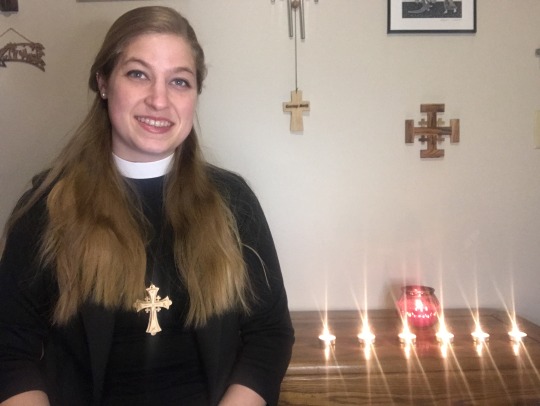
Updated Good Friday Zoom background for the Tenebrae service
Good Friday 4/2/2021: Lot’s of sleeping, cleaning, and Jesus Christ Superstar ending the day with a Tenebrae service and virtual date night with Jon.
Saturday of Holy Week 4/3/2021: I took a much needed break to spend the day at home with my parents and my sister. It was good to rest and relax for once. I ended the night by finishing my sermon and redecorating my office for worship.

Easter Sunday worship background!
Easter Sunday 4/4/2021: Alleluia Christ is Risen! The reward for surviving Holy Week was an incredible day with my family, all of us together for the first time in nearly 500 days.
This was definitely a Holy Week to remember. I can’t wait to get into my first call and do this all again next year!
1 note
·
View note
Photo

What I love about being a part of ministry at @skylinechurch is to be able to work with an amazing senior pastor Dr. Jim Garlow. Today was taping day for the Cultural & Biblical Institute, The Call of the Laity. #pastorintraining #ministrystudent #alwayslearning http://ift.tt/2uvkoNO
0 notes
Text
A Morning Reflection
Growing up at Bear Creek Camp in the Poconoes was my favorite part of the summer. It was a week (or two) away from home of fun and faith and friends. Every time my parents dropped me off at camp, my mom would say “say hi to God for me, I know God lives at camp.”
This weekend I am on retreat with 70 people from Firth Lutheran church at Calumet Lutheran Camp in Freedom, New Hampshire. Im staying in a house right on Lake Osipee with the youth and the place is so pretty. I pushed my bed up against the window so I could wake up to the sunrise over the lake.
As I stared out my window this morning at this beautiful, frozen, snow covered lake, the first thing I thought was “God is good” and the second thing I thought is “God lives here too.”
Now I’ll skip the theology lesson that I believe God is with us all the time, everywhere we go. But for me, God stands out the most in nature. When I can just marvel at the beauty, peace, and true quiet around me. That’s when it’s easiest to see and hear God at work.
Church camp was such an important part of my faith journey. To this day I wish I could still be a camper or counselor or anything just to be at camp. But less than 24 hours at Calumet and it feels like home. Which brings me to my morning conclusion: God is always with us, but there is something about church camp that gives me the opportunity to see and listen to God in ways I just can’t do anywhere else.
Let’s see where can find God today....

1 note
·
View note
Audio
Check out my latest sermon at Upper Dublin Lutheran Church from this past week. It was Bear Creek Camp Sunday so I was more than excited to share my time as a camper and a few throwback photos!
Here’s the photo I shared of my first ever group photo from camp circ. 2003

These are the two photos I shared from the story I told in the sermon:

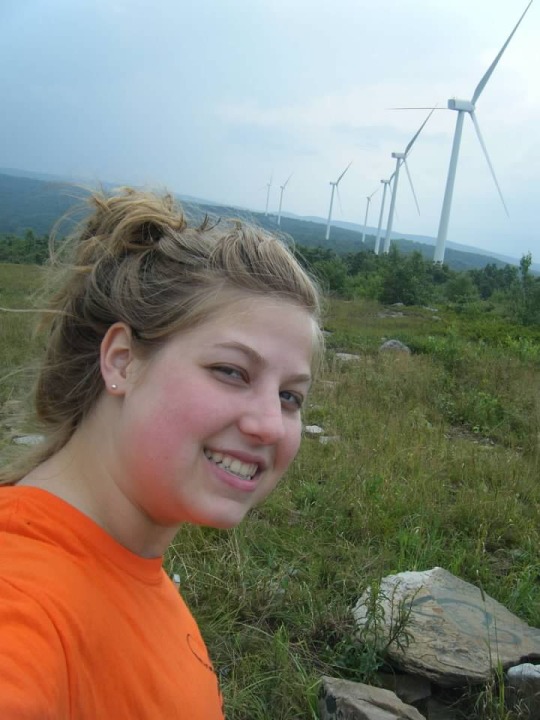
(Taking a selfie before selfies were a thing!)
#pastorintraining#seminarylife#pastor school#pastor in training#bear creek camp#bcc#lutheran#church camp#camp#summer camp
1 note
·
View note
Text
A Dove and a Pigeon took Greek...
If you’ve spent any time around me lately, you’ve probably heard a complaint or two about my Ancient Greek class. It’s terribly frustrating learning a dead language, while also taking other classes, and working, and doing the church thing, and trying to have friends. Yet, despite all the grammar and syntax, vocab and now all the ways words change form depending on their use, that I can never quite get; every now and then, we do some pretty cool stuff.
A few weeks ago, I took my Greek midterm, which I passed, with flying colors.(insert jumping up and down with glee). On the test, we had to talk about translation and the impact it can have on interpretation.
Mark 1:10 reads in Greek: καὶ εὐθὺς ἀναβαίνων ἐκ τοῦ ὕδατος εἶδεν σχιζομένους τοὺς οὐρανοὺς καὶ τὸ πνεῦμα ὡς περιστερὰν καταβαῖνον εἰς αὐτόν·
or in the ESV reads: “And when he came up out of the water, immediately he saw the heavens being torn open and the Spirit descending on him like a dove.”
The question on the test asked how three different versions translated the word: περιστερὰν from Greek to English. All three that I looked at (NRSV, ESV, and KJV) translated it as “Dove.”
The second part of the question was to look up περιστερὰν in three different lexicons (Greek dictionaries). Here’s what I got:
Thayer = a dove
Mounce = a dove, pigeon
Newman = a dove, pigeon
Now, tell me a dove and a pigeon are the same thing yes?
About that. Two years ago I read a book called “Consider the Birds” by Debbie Blue. It’s a book I wanted to write a blog post about but never found the words for, because it profoundly shaped my YAGM year and my journey to seminary. See, Debbie Blue take the different birds in the Bible, gives them each their own chapter, and talks about the meaning, the symbolism, and how that can influence our understanding and application to faith.
The chapter that stood out to me the most, was the chapter on Doves. See Doves and Pigeons come from the same family, yet one we idolize and one we (okay, at least I) hate. We love doves, they are beautiful and symbolic. They were used to show the flood had ended, they are released at weddings, people get them tattooed as a sign of the Holy Spirit; they are just pretty birds.
But pigeons? They’re kind of ugly and they’re quite obnoxious: always in your face, bothering you for food; they’re not the cleanest of birds. But Debbie Blue argues they are one and the same and they relate beautifully to faith.
We want to see faith as a dove, something beautiful and held above others. Yet faith is really like the pigeon, down in the dirt, annoying, and right there in your face no matter how many times you try to send it flying away. To translate the Holy Spirit as something as majestic as a dove is to put it above the rest, yet isn’t it better seen as a pigeon, always annoying and in our face whether we want it or not?
To translate this text from the Greek as “the Holy Spirit descended on him like a pigeon” provokes a profoundly different image. I quote this thought from my midterm exam: “Theologically, to change the image of the Holy Spirit from a majestic dove to a pain in the ass pigeon makes it more relatable and less up on a pedestal. You would have to confront that the Holy Spirit is real and there.”
This is why learning Greek is annoying but so totally cool. The application of the language to the original text can create so much more meaning and understanding than just comparing English translation to English translation. We do this frequently in class and ask the question “which is most true to the Greek.” It’s fascinating how different the translations can be, and how much of an impact that can have on our own interpretation and application of religion and spirituality.
I shall leave you with the beautiful drawing I provided on my midterm examination:

#pastor in training#pastor school#seminary#greek#ancient greek#koine greek#translation#bible#new testament#holy spirit#dove#pigeon#books#nerd#birds#pastorintraining#united lutheran seminary#uls#lutheran#elca
4 notes
·
View notes
Link
Check out this blog post I wrote for the Ambler Union! I can’t wait for our first event on October 15th!
1 note
·
View note
Text
Lessons from my plants
In this new year of 2021 I am participating in a weekly group exploring the idea of Anxiety as an Opportunity for Spiritual Growth. This week we were tasked to take 10 minutes and go outside to observe something in nature in a new way.
Now, I live in an apartment complex and after the latest snowstorm, it would have taken too long for me to bundle up, get outside, spend time, and get back in within the ten minute timeframe. So instead, I spent some time with my plant babies. I’ve had some of these plants for 8 years but I can honestly say, I think this is the first time I took intentional time to look at them for fun and not just to care for them.

(Not pictured are the mass quantity of air plants that hang out in my office)
While spending time with my plants I noticed something interesting: Each of my them has the ability to overcome adversity and at the same time, they show signs of the trouble and trials they have overcome.
My 8 year old cactus is yellow at the bottom from old age and has a skinny “waist” from the year that it lived in a basement while I was in South Africa and was wildly neglected, yet it has grown considerably since then because I tended to and cared for it.

My Mexican Snowball succulent has grown very weird in the last year and shows visible signs of all the broken and missing branches on it from all the times I wasn’t careful when moving it. Yet, it continues to grow.

My Lace Aloe succulent pretty much fell over after I replanted it into it’s pot, the roots just aren’t strong enough to hold the plant up. So in its sideways state, my succulent continued to grow and reach for the sun.

Each of my plants have a story to tell but they all need individual attention and care. I have a water schedule for them and for the most part, I know what they need on any given day by the way they are growing. If they’re leaning too far to one side, it’s time to rotate. If they’re floppy, I missed their watering day. If their leaves are yellow, it’s time to prune.
Spending this time with my plants made me realize something. I care for each of these plants individually, arguably, I care for them better than I care for myself. If they each need individual care, time, and attention, why do I not care for the different parts of myself individually?
My mental health is not my physical health is not my spiritual health. There is no one fix-all remedy, yet I neglect to name that and so often, society does too. As I continue to grow in my understanding of and care for mental health and anxiety in a spiritual way, I will continue to turn to scripture. Anxiety and mental health are present in scripture and can provide comfort to us in times of need, we just have to be willing to see it, name it, and embrace it.
Matthew 6:34 “Therefore do not be anxious about tomorrow, for tomorrow will be anxious for itself. Sufficient for the day is its own trouble.”
I know my plants help with my mental health. They give me something to care for and love, and in return they give me clean air and the colors of their beauty. In all the time I have spent with my plants, I never realized they could also be helping me on my own spiritual journey, teaching me these lessons just by their existence.
What might nature be teaching you about God, spirituality, and your own mental health?
#pastorintraining#plants#seminarian#lutheran#spiritual journey#anxiety#anxiety and spiritual journey
0 notes
Text
An Update
As I blog about my journey through seminary and ministry (or try to at least), I’m realizing time and time again that there is no better way to describe everything than: Hard but Holy. It was what I held onto during my Clinical Pastoral Education (CPE) summer as a Chaplain at Thomas Jefferson University Hospital. It is what I held onto during my semesters of seminary that got difficult with the expectations to get all my homework done while working and while serving at a church. It’s the phrase I continue to hold onto during my internship year as I explore ministry full time in my church here in Massachusetts.
I was reminded of this phrase earlier today at church. The week before Christmas we had a member put on hospice who was “ours.” She lived in our low-income senior housing and had no family outside that of our congregation and one friend who lived out of the state. We took turns as a congregation going to visit the woman, sitting with her, singing to her, talking and reading scripture to her. She was unresponsive, but I believe she could hear us until the very end.
It was an interesting experience in light of Christmas. Reading her the Christmas story brought new meaning to the phrase “Do Not Be Afraid” and the promises that come with the birth of Jesus. It was extremely hard to sit there in her final days, but it was profoundly holy.
This week the woman’s friend is in town and I had the chance to meet her after worship. She came up to thank me for everything I had done to be there for our member, who ended up dying on the morning of Christmas Eve. I told her it was my pleasure, that it was part of my calling to be with the people of God, through the good times and the bad; the hard but also, the holy.
I know I haven’t written recently, in part because I just haven’t had the words. My internship church is keeping me busy with periscope, Bible study, knitting groups, meetings with other pastors, pastoral care meetings and visits, planning confirmation, youth, and adult forum curriculum, and so much more. So far five months in, I am discovering a love for teaching all age groups, a joy in sitting with our older members who gather to knit on Thursdays, and surprisingly enough, having a wicked time writing sermons. I’m loving everything about ministry because all of it, in some way or another, is hard but holy.
Enjoy a few photos from the last few months:

My internship site: First Lutheran Church in Waltham, MA

My very first Sunday at church on September 1, 2019

Our marvelous choir sings 2-4 times each month and on all special occasions!

In Advent, we had midweek services of candlelight for reflection and meditation.

Youth Christmas Party in our newly created youth room! We have never had a youth group before so my internship project is to help get this off the ground!

Christmas Eve at church! It was a wonderful celebration with candlelight and readings. It was a lot of work to get there, but the end result was beautiful.

Here’s to the next few crazy months of internship and the approach of Lent, Holy Week, and Easter. Wish me luck!
#pastorintraining#seminarian#vicar life#pastor in training#vicar#lutheran#christmas#worship#advent#youth group#youth ministry#teaching#preaching#seminary internship#internship year
0 notes
Text
Things I Learned While Working in the Archives
For the last four months, I worked at the Lutheran Archive Center at Philadelphia, one of the oldest archive centers, I think, in the United States. We have the oldest records and history of Lutheranism in America dating back to the original journals and letters of Henry Melchior Muhlenberg! We are also the regional archive center for the ELCA’s Region 7 for the Southeastern PA, Northeastern PA, New Jersey, Metro NY, Upstate NY, New England, and Slovak Zion Synods. We house their synodical records as well as the records of congregations that have closed.

(Items from the Ministerium of Pennsylvania, some of our oldest records)
While working in the archives, I worked on lots of different projects. I inventoried our artifacts including cool things like a Muhlenberg Bible (1742), Pew Rentals from Frederick Muhlenberg (1794), and a traveling Sunday School story box called The Royal Scroll (1896) - just to name a few. I also reorganized the entire vault so that our synod records could be housed together and not spread out across multiple rows; that means that I’ve moved around hundreds of boxes (weighing 20-40+ pounds) while also inventorying their new home to make finding their records faster. One of the uses of the archives is for research - we have researchers looking for new and exciting pieces of history, and we have a lot of people inquiring about their genealogy which is housed in these records. Besides these two major projects, I helped with sorting boxes, processing closed congregations, filing materials, and exploring Lutheran history.

(Top: Pew Rental receipt signed by Frederick A Muhlenberg. Bottom: me geeking out over a Muhlenberg Bible)

It’s been a lot of fun, but also some of the hardest work I’ve done in a while. I keep joking “who needs a gym when you work in the archives” because I get a workout most days while working. This work has been challenging and rewarding, but most of all, I’ve learned a lot.
There is a time for everything and a time for every matter under the heavens: a time for giving birth and a time for dying, a time for planting and a time for uprooting what was planted, a time to kill and a time for healing, a time for tearing down and a time for building up, a time for crying and a time for laughing.... - Ecclesiastes 3
Working in the archives has taught me about the reality of death. Everything has a time and a season - not just people, but congregations, organizations, and records. It’s not really sad working down here because this is just the reality of life. We have to hold on to the Gospel promise of the resurrection. People have gone before us, congregations have merged and closed throughout history, but at the end of the day, we will all be with our Creator doing the work our Creator has asked us to do. We don’t need a building to do God’s work, we should be doing it in the community and in the world. There’s no denying that the church needs to change and working in the Archives has only affirmed that. We need to find new ways of doing ministry and reaching people where they are.
It’s the circle of life, it moves us all, through despair and hurt, through faith and love; till we find our place, on the path unwinding. It’s the circle of life. - The Lion King
Working in the archives has taught me that we just don’t need to keep everything. Whenever we open a box we ask the question “What does this say about Lutheran history?” If there’s a good answer, it stays, if the answer is “nothing,” then it goes. We need to learn from our past, but we don’t need to keep every single thing from it. This process made me think differently about my own possessions and the items I’ve accumulated, what do they say about me? (that she’s a book hoarder, I mean, a pastor in training....). We hold so much sentimental value to things, but what happens when that value is lost years and generations after. It goes back to that idea of the circle of life, a time for everything. My possessions mean something to me right now, but if they lose that value and meaning, then it’s time to call Marie Kondo and say “thank you for your service,” and send it on its way.
For the body is not one member, but many - 1 Corinthians 12:14
Working in the archives has taught me the importance of teamwork and staying openminded. We have staff and volunteers from all walks of life who like to do things in certain ways. One of the hardest parts about working to reorganize the vault was trying to mesh all the different ways people work and create a system that is helpful and makes sense to everyone. In the past, there was not a ton of conversation between the team to make things go smoothly, which is how we ended up in organizational chaos. With people working at different times and on different schedules, it has been a good learning experience getting to know the team and working with an open mind - especially since I’m the one with the least amount of experience with archiving! This isn’t the first, nor will it be the last time where I am working with people of all different backgrounds and knowledge with a common goal in mind. In fact, this is pretty much what happens when you work for the church; whether its a congregation, synod, or the archives. When we remember the value of every member of the body of Christ, we can work together to accomplish anything.
You think the only people who are people, are the people who look and think like you. But if you walk the footsteps of a stranger, you’ll learn things you never knew, you never knew - Pocahontas
Working in the archives has taught me about the importance of valuing people’s gifts and the joy it can bring to see them use it. I have learned so much about the different people I work with and it brings me sheer joy to see them use their gifts and talents. I have seen my supervisor (and the Archives Director) Lisa geek out over history more than once and her excitement about things we’ve found or when talking to researchers makes me excited about history and has taught me so much about the history of the Lutheran church. I have watched Jim, our researcher, use his knowledge and ability to read 18th Century German Script to find genealogical records that I would have thought were impossible to find. He has taught me so much about old parish records and the importance of keeping a parish record up to date. Our fabulous volunteers have taught me the importance of friendship and working together - their joy and laughter each week brightened my day and made all of us work a little harder.
I couldn’t possibly put into words everything I learned, but here are a few other random things I learned:
- Don’t judge a book by its cover, do judge a congregation by their bulletin
- Don’t put a picture of a clown on the front of your bulletin, it’s terrifying
- Staples belong to the devil and will literally destroy anything you want to archive (they will also destroy the hands of whoever has to process the records when they remove them)
- Don’t wait to the last minute to preserve your history (specifically your congregation). Treasure your history and let it be part of your congregation
- Don’t make an anniversary commemorative plate, they’re not practical
- Old paintings are creepy because their eyes follow you everywhere
I am so thankful for my time working in the Archives. It was an amazing job and I can’t wait to see all the wonderful and new things they are able to do in the coming future. To learn more about how you can get involved, visit us at: https://www.lacphila.org/

0 notes
Text
Let’s Talk About Language
Words are our most inexhaustible source of magic - Albus Dumbledore
Without words we would not have language, without language we couldn’t communicate, without communicating we would most likely live very isolated from those around us. Learning to speak and use words is one of the greatest hurdles children face when they are still just babies. Until we have words, we can’t communicate with others; we use words every day to say our feelings, our needs, our hopes, and desires. And yet, when we don’t have words and still need to make ourselves heard, we find alternative ways to communicate. I think about my nephew who uses his version of sign-language so he can say when he is hungry or needs help, and if he doesn’t have a sign for something, my sister helps him come up with a new one.

Language is about finding ways to adapt. The early people developed language because they needed to find a better way to interact. Now, we learn our first language in the home and in school, but over time this adapts into slang and is impacted by regional accents and dialects. When words don’t make sense to us, we find a new way to say it. When we cross language barriers we do the same thing. When I moved to South Africa, I quickly had to adapt to the British-English and start calling the trunk of a car, the “boot,” or calling an apartment a “flat.” No matter where we go, we have to find ways to adapt to our current context and culture; whether it is learning a completely new language, or understanding the different meanings for words, or even just trying to decipher the accent (I’m looking at you New England and the deep South).
When we devote so much time in our daily lives to language, why do we not do the same in our churches? I could probably write an entire post, filled with words that even I don’t really understand the meaning or use of but that relate to church: think along the lines of liturgy (that thing we do in worship), theology (ways of looking at God’s presence in something), presider (the person who gets to say the Words of Institution), paten (the plate that holds the communion bread), Eucharist (another word for Holy Communion)... there are so many words that we can use to describe elements of church but that just doesn’t convey meaning, or the same meaning, to everyone.
I don’t know about you, but hearing words that I don’t have a meaning for alienates me from the worship experience. Worship should be fun and inviting, it should be exciting and engaging. We have a habit in our churches to take something that should be the highlight of our day and making it the most boring part. We need to look at our churches and worship spaces through the use of language. What language do we use to convey parts of worship that could be insider language? What language has changed over the years? Maybe instead of saying “the Gospel of Jesus Christ,” you might say the “Good News of Jesus Christ.” Our traditions and elements of worship came from an oral tradition where they changed and adapted depending on who was present. Do we still do this today? Are we still adapting and changing to those who are in the room or are we stuck to doing things by the book?

Our traditions and religion have crossed continents, spanned generations, and made its way through different cultures; because it dared to make the changes it needed to make the story relevant to the people within every context.
I think about my church family in South Africa. I lived in a township near Johannesburg where most of the 11 official languages in South Africa were spoken. In order to accommodate the different primary languages of our members, my church held worship in some 5-7 different languages each week. We did parts in English, Sepedi, and isiZulu, but we sang in countless others. We made the changes necessary to help the story of Jesus spread to all those who needed and wanted to hear it.
I wonder how looking at the language of our church, can help us keep church and religion relevant in people’s everyday lives. The story of Jesus Christ has already crossed time, space, culture, and context, but how can it continue to do so for the rest of eternity? It feels like we have become so stuck in our “traditional ways” that we are scared to look at worship and church with new eyes to ask ourselves, how can the language we use in worship be relevant both inside and outside the church?
We will celebrate in about a month, the church holiday of Pentecost where the presence of the Holy Spirit comes among the people and helps them to understand the story of Jesus in their own language. But it doesn’t end there. The people then go forth spreading the Good News of Jesus Christ in every language. The Gospel is meant to be shared in whatever way works for people: reading out loud, acting it out, listening to it in song.
I took a class this semester on Acts, that explored this idea. We took a passage in Acts and made our own translation from the various Bible translations and the original Greek. The next day we were tasked to perform the passage, acting it out and embodying the characters talking to one another. The third day, we had to tell the story from memory. The purpose of the activity was to tell the story the way the first Jesus followers told the story, through oral tradition. We made the Bible fun in a way I have not experienced outside of Vacation Bible School programs. The Bible is fun! We need to look at language in new ways so that we can continue to make it fun and keep people engaging with it in their daily lives.
So I ask you, what language might we need to change? What are the ways we can adapt and grow to make church and religion fun and an important part of our everyday lives?
0 notes